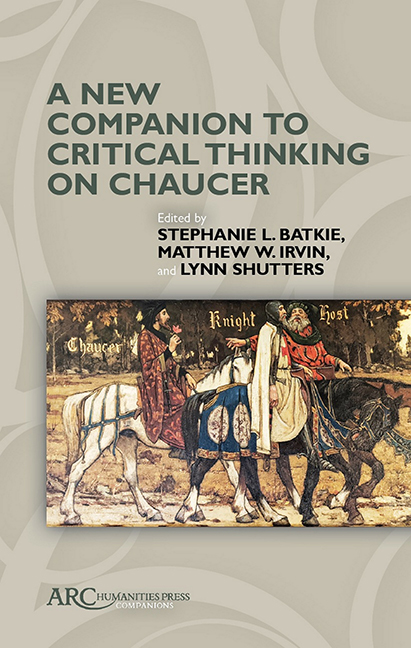Book contents
Craft
Published online by Cambridge University Press: 21 October 2021
Summary
House of Fame
Troilus and Criseyde
Anelida and Arcite
Treatise on the Astrolabe
General Prologue
Man of Law's Prologue and Tale
Canon's Yeoman's Tale
Parliament of Fowls
The lyf so short, the craft so long to lerne […]
(Chaucer, The Parliament of Fowls)GEOFFREY CHAUCER OPENSbook 3 of the House of Fame by reminding us that he is a creative writer—and a grouchy, somewhat insecure one at that. Having visited the temple of glass and endured capture by the eagle, the writer–narrator finds himself standing at the foot of a great hill (actually a mass of ice, as he will soon discover) on which the House of Fame is built. Before describing and interpreting what he sees, the eponymous Geffrey issues an invocation that proposes an indissoluble link between the quality of his versification and the wonders he is about to describe:
O God of science and of lyght,
Appollo, thurgh thy grete myght,
This lytel laste bok thou gye!
Nat that I wilne, for maistrye,
Here art poetical be shewed,
But for the rym ys lyght and lewed,
Yit make hyt sumwhat agreable,
Though som vers fayle in a sillable;
And that I do no diligence
To shewe craft, but o sentence.
And yif, devyne vertu, thow
Wilt helpe me to shewe now
That in myn hed ymarked ys—
Loo, that is for to menen this,
The Hous of Fame for to descryve—
Thou shalt se me go as blyve
Unto the nexte laure y see,
And kysse yt, for hyt is thy tree.
Now entre in my brest anoon!
(House of Fame, 1091–109)One of the most revealing moments in this self-consciously writerly passage is the couplet smack in the middle of the invocation: “And that I do no diligence /To shewe craft, but o sentence.” I won't make an effort to show my craft in what follows, that is, but only the sentence or meaning. While referring explicitly to the practice of Chaucer's own literary making, the couplet also conveys a certain degree of self-consciousness on the writer's part about putting his poetical tricks on display.
- Type
- Chapter
- Information
- A New Companion to Critical Thinking on Chaucer , pp. 143 - 158Publisher: Amsterdam University PressPrint publication year: 2021



